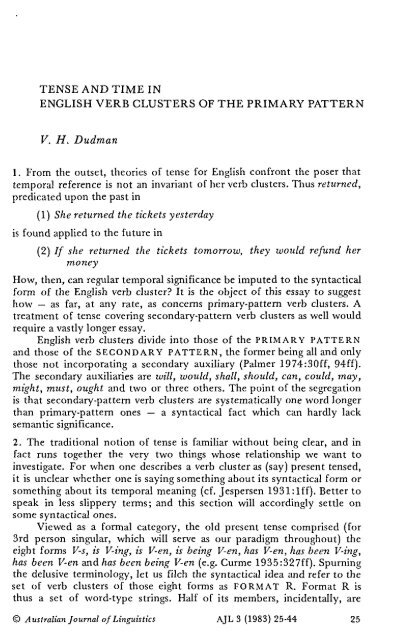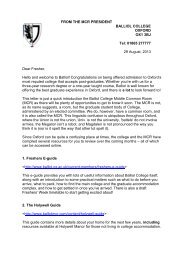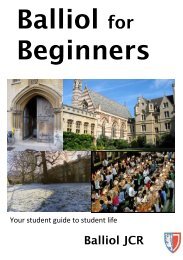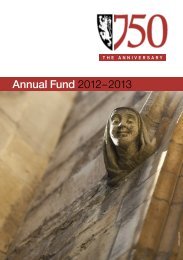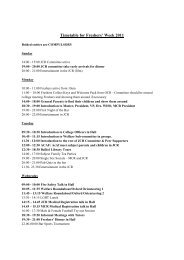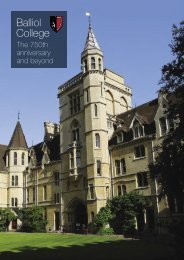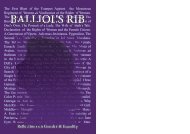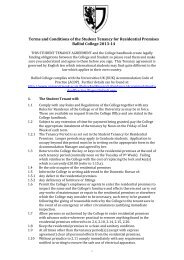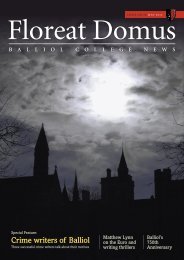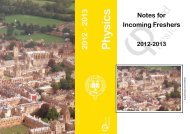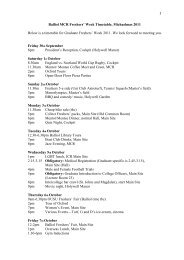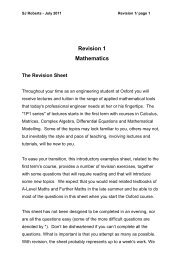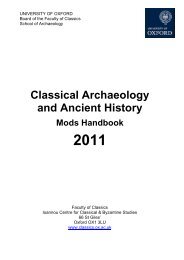TENSE AND TIME IN ENGLISH VERB CLUSTERS OF THE ...
TENSE AND TIME IN ENGLISH VERB CLUSTERS OF THE ...
TENSE AND TIME IN ENGLISH VERB CLUSTERS OF THE ...
- No tags were found...
You also want an ePaper? Increase the reach of your titles
YUMPU automatically turns print PDFs into web optimized ePapers that Google loves.
<strong>TENSE</strong> <strong>AND</strong> <strong>TIME</strong> <strong>IN</strong><br />
<strong>ENGLISH</strong> <strong>VERB</strong> <strong>CLUSTERS</strong> <strong>OF</strong> <strong>THE</strong> PRIMARY PATTERN<br />
V. H. Dudman<br />
1. From the outset, theories of tense for English confront the poser that<br />
temporal reference is not an invariant of her verb clusters. Thus returned,<br />
predicated upon the past in<br />
(1) She returned the tickets yesterday<br />
is found applied to the future in<br />
(2) // she returned the tickets tomorrow, they would refund her<br />
money<br />
How, then, can regular temporal significance be imputed to the syntactical<br />
form of the English verb cluster It is the object of this essay to suggest<br />
how — as far, at any rate, as concerns primary-pattern verb clusters. A<br />
treatment of tense covering secondary-pattern verb clusters as well would<br />
require a vastly longer essay.<br />
English verb clusters divide into those of the PRIMARY PATTERN<br />
and those of the SECONDARY PATTERN, the former being all and only<br />
those not incorporating a secondary auxiliary (Palmer 1974:30ff, 94ff).<br />
The secondary auxiliaries are will, would, shall, should, can, could, may,<br />
might, must, ought and two or three others. The point of the segregation<br />
is that secondary-pattern verb clusters are systematically one word longer<br />
than primary-pattern ones — a syntactical fact which can hardly lack<br />
semantic significance.<br />
2. The traditional notion of tense is familiar without being clear, and in<br />
fact runs together the very two things whose relationship we want to<br />
investigate. For when one describes a verb cluster as (say) present tensed,<br />
it is unclear whether one is saying something about its syntactical form or<br />
something about its temporal meaning (cf. Jespersen 1931:Iff). Better to<br />
speak in less slippery terms; and this section will accordingly settle on<br />
some syntactical ones.<br />
Viewed as a formal category, the old present tense comprised (for<br />
3rd person singular, which will serve as our paradigm throughout) the<br />
eight forms V-s, is V-ing, is V-en, is being V-en, has V-en, has been V-ing,<br />
has been V-en and has been being V-en (e.g. Curme 1935:327ff). Spurning<br />
the delusive terminology, let us filch the syntactical idea and refer to the<br />
set of verb clusters of those eight forms as FORMAT R. Format R is<br />
thus a set of word-type strings. Half of its members, incidentally, are<br />
© Australian Journal of Linguistics AJL 3 (1983) 25-44 25
26 V.H. DUDMAN<br />
PHASE-MODIFIED, in the sense that they contain a part of auxiliary<br />
HAVE followed by the -en part of some verb. Next, let us define, upon<br />
format R as domain, a function p so that can take members of S as argument:- If s eS, then (i) if s<br />
e T, then
<strong>TENSE</strong> <strong>AND</strong> <strong>TIME</strong> 27<br />
are employed to volunteer the terms of some plan, intention, determination,<br />
arrangement or schedule relating to the future:<br />
(6) According to our original plan, the conference began next Monday,<br />
but now it begins tomorrow<br />
(7) Initially the conference had begun next Monday, but many<br />
delegates complained and. . .<br />
What is registered by the format of the verb cluster in such a case is patently<br />
the time of the schedule's validity — a point to which we shall revert<br />
(in section 6). Meanwhile, these 'pre-arrangement' uses are instanced here<br />
simply to illustrate the diversity of the distinctions that can be drawn<br />
among verb-cluster uses.<br />
And now I should like to plead a dichotomy of my own.<br />
4. Some of the uses that come a verb cluster's way are confined to its<br />
occurrences in non-principal clauses. Each primary-pattern verb cluster<br />
has uses, that is to say, which never accrue to it when it occurs as the<br />
finite verb of a one-clause sentence or indeed of any principal clause —<br />
uses accessible to it only when it occurs in some non-principal clause.<br />
A case in point is the future-related use of returned we descried in (2).<br />
One can indeed say<br />
(8) She returned the tickets tomorrow<br />
to allege an erstwhile pre-arrangement, after the manner of (4); but under<br />
the only unforced interpretation of (2), returned moots not an erstwhile<br />
pre-arrangement but a future contingency, and my point is that THAT<br />
use is never accessible to returned in the context of any one-clause sentence.<br />
When returned is taken THAT way, (8) cannot be understood as<br />
an English sentence.<br />
The past-related use of returned we found in (1) is quite different:<br />
it crops up in one-clause sentences and non-principal clauses alike. Indeed<br />
it is precisely because we recognise the same use of returned in (1) as in<br />
(9) If she returned the tickets yesterday, her refund was posted this<br />
morning<br />
that we can conclude, from (1) and (9) taken together, that her refund<br />
was posted this morning. Occurring in the context of (9), (1) is construed<br />
exactly as it would be were it standing alone as a one-clause sentence.<br />
Let us speak of those uses as PRIME which, like the past-event use<br />
of returned we discovered in (1) and in (9), are accessible to the finite<br />
verb clusters of one-clause sentences. Then the central contention of this<br />
paper is simply that, in English, not all verb-cluster uses are prime uses.<br />
Indeed, the primary-pattern verb clusters of English are much given<br />
to non-prime use, as reflection upon the following examples will disclose:<br />
(10) // she returns the tickets tomorrow, they will refund her<br />
money
28 V.H. DUDMAN<br />
(11) // she had returned the tickets tomorrow, they would have<br />
refunded her money (said after she has lost or destroyed the<br />
tickets, likely)<br />
(12) // your father was alive today, he would be turning in his grave<br />
(13) If your father had been alive today, he would have been turning<br />
in his grave<br />
(14) If Hitler had invaded England in 1940, Germany would have<br />
won the war<br />
Moreover, the non-prime uses we have just discovered occur systematically:<br />
Figure 2 reveals an unignorable and intriguing pattern.<br />
R<br />
- cf.<br />
(8)<br />
FUTURE<br />
S<br />
- cf.<br />
(2)<br />
T<br />
- cf.<br />
(9)<br />
PRESENT<br />
S<br />
T<br />
- cf.<br />
- cf.<br />
(10)<br />
(11)<br />
PAST<br />
T<br />
- cf.<br />
(12)<br />
Figure 2. Undeclarative uses<br />
In due course I shall try to elicit the secret of that pattern; but my present<br />
purpose is one merely of demarcation: whatever other non-prime uses the<br />
verb clusters of English may transpire to tolerate (cf. section 10), there is<br />
at least the genre delineated in Figure 2, and these uses I hereby dub<br />
UNDECLARATIVE uses.<br />
5. What we expect of a theory of tense is a story connecting form and<br />
time, and in this section I venture mine, for the primary pattern. But<br />
primary-pattern verb clusters come in sixteen syntactical forms (cf.<br />
section 2), and the WHOLE story, chronicling how the speaker eventually<br />
settles upon one of these sixteen, evidently involves a number of independent<br />
decisions. Now, in what order these decisions are taken by the best<br />
speakers I, of course, cannot say; but MY speaker, pending outcry, saves<br />
the question of tense until last. In effect, by the time he turns to choose<br />
what can fairly be called the tense of his verb cluster, he has already —<br />
upon Heaven knows what arcane grounds — made his eight-fold choice<br />
among the aboriginal primary patterns (cf. section 2): he has lit upon<br />
a member of R. Let us join him then as, clutching his member of R, he<br />
confronts the task of arbitrating tense.<br />
What he has to decide, in practical terms, is simply whether to use
<strong>TENSE</strong> <strong>AND</strong> <strong>TIME</strong> 29<br />
his pre-selected member of R as it stands or to treat it to a dose or two of<br />
first; but of course the choice presents itself to him, the encoder, as a<br />
choice between alternative pieces of <strong>IN</strong>FORMATION. The choice, surprisingly,<br />
is a ternary one: the speaker is obliged, willy nilly, to opt for<br />
exactly one of the following three pieces of temporal information:<br />
(i) It is (identical with) the point of speech;<br />
(ii) It is a point past with respect to the point of speech;<br />
(iii) It is a point past with respect to some point itself past with<br />
respect to the point of speech.<br />
He then encodes his selection in accordance with the following instruction:<br />
To select alternative (n), apply
30 V.H. DUDMAN<br />
in what is understood about the location of p. In these three uses, in<br />
other words, the SAME CONDITION is conveyed to be satisfied at a<br />
temporal point p, variously located.<br />
Similarly, comparing<br />
(18) Grannie lives in Cockroach Lane<br />
(19) At the time of her arrest, Grannie lived in Cockroach Lane<br />
(20) A year before her arrest, Grannie had lived in Cockroach Lane<br />
we observe that each of lives,
<strong>TENSE</strong> <strong>AND</strong> <strong>TIME</strong> 31<br />
temporal point p. I do not of course claim to have captured the niceties<br />
of any of these predication conditions. Such artistry were wasted here.<br />
(Furthermore, seeing that the predication condition is specified, not by<br />
the verb cluster alone, but by it together with much else — often everything<br />
else — in the verb cluster's clause, we cannot reasonably covet at<br />
this stage a comprehensive account of its articulation for the general<br />
case, for which hardly less would suffice than the code of English broken<br />
in toto: cf. section 10.)<br />
Occasionally, by the way, a member of a trio is missing, usually the<br />
third. Thus while (26) and (27) are certainly English, the same can hardly<br />
be said for (28):<br />
(26) I'm to be Queen of the May, Mother<br />
(27) He was to be thrice Lord Mayor of London<br />
(28) She had been to be a virtuoso pianist<br />
I expect an explanation for each such gap.<br />
When the verb cluster r is phase-modified, ip(r) is a member of T,<br />
and y(
32 V.H. DUDMAN<br />
The question naturally arises whether a constant meaning can be<br />
imputed to phase modification wherever it arises in the primary pattern.<br />
And the answer, it seems to me, is certainly: phase modification has the<br />
unfailing semantic effect of locating ONE point by depicting it as PAST<br />
WITH RESPECT TO SOME O<strong>THE</strong>R. On the one hand, (29) and (30)<br />
alike locate the goal as past with respect to the point of predication. On<br />
the other, (17) locates the point of predication itself as past with respect<br />
to the disturbance. The common factor is autoptical. In sum, phase modification<br />
can crop up at two different stages in the encoding process —<br />
either in the prior choice of an aboriginal element of R or in the subsequent<br />
administration of a second dose of ip — and although it always<br />
signals that one point is past with respect to another, what the points<br />
ARE which are thus separated depends upon the stage of the encode -<br />
ment at which the phase modification enters. For, of course, when phase<br />
enters in the first way, it contributes to the articulation of the predication<br />
condition, whereas when it enters in the second it helps locate the<br />
point of predication.<br />
So far in this section the sample sentences have all been one-clause<br />
ones; but it would never do if that encouraged the illusion that prime<br />
uses are somehow intimately concerned with assertion. We recognised<br />
the same use of returned in (9) as in (1), remember: hence the possibility<br />
of modus ponens. The point about (1) and (9) is that they admit of —<br />
indeed implore — interpretations under which the same proposition as is<br />
asserted when (1) occurs between fullstops is merely hypothesised when<br />
(9) does.<br />
And if the notion of a PROPOSITION just invoked is permissible,<br />
then I can expand slightly upon what I said in section 5 about prime uses:<br />
To parse a clause in such a way that its verb cluster receives a prime use is<br />
to interpret that clause as expressing the proposition that a certain condition<br />
is or was as a matter of historical fact satisfied at a time encoded<br />
into its verb cluster by means of the code explained in section 5. Prime<br />
uses are for expressing propositions, things that can be said Yea or Nay to.<br />
7. It is not only prime uses of verb clusters that go to specifying predication<br />
conditions. Every use does; and in particular every undeclarative<br />
use does. The condition upon a temporal point p whose satisfaction for<br />
some past value of p is averred in (1) is patently the very same condition<br />
whose satisfaction for some future value of p is contemplated in the ifclauses<br />
of (2), (10) and (11). Similarly it is the same condition whose<br />
satisfaction at the point of speech is on the one hand affirmed in (3) and<br />
on the other mooted in the r/-clause of<br />
(32) If the conference began next Monday it would suit me better<br />
and again it is the same condition whose satisfaction at the point of<br />
speech is on the one hand affirmed in (29) and on the other mooted in<br />
the i/-clause of
<strong>TENSE</strong> <strong>AND</strong> <strong>TIME</strong> 33<br />
(33) If Hoddle had just scored he would not be on the bench.<br />
What is different about undeclarative uses is that it is not the time of<br />
the condition's satisfaction that is registered by the tense of the verb<br />
cluster. This we know already, from a glance at Figure 2 (where, we now<br />
see, the time listed in the left-hand column is the contemplated time of<br />
the predication condition's satisfaction). So something else conditions<br />
the tense in these undeclarative cases, and in the next section I shall try<br />
to explain what it is. Meanwhile, the present section will be engrossed<br />
with prefatory remarks about 2/-sentences and their interpretations. The<br />
point of this is that undeclarative uses are sequestered in non-principal<br />
clauses, and in this essay, for definiteness, I shall be concentrating on their<br />
haunts in j/-clauses.<br />
As a matter of history, logicians and grammarians have always sponsored<br />
flatly opposed programmes for analysing //"-sentences. The logicians<br />
have championed the precept that if is a B<strong>IN</strong>ARY CONNECTIVE, which,<br />
being interpreted, means that not only the principal clause but also the<br />
string of words in the scope of if are to be parsed as independent grammatical<br />
sentences (e.g. Quine 1966a:163; Anderson &: Belnap 1975:<br />
477ff). The grammarians have meanwhile gone sturdily on classifying<br />
z/-clauses as AD<strong>VERB</strong>IAL (e.g. Curme 1931:318ff; Kruisinga 1932:<br />
400ff). I, perversely, sympathise with both parties. On the one hand, if<br />
occurs in (9) as a binary connective: as we remarked at the time (cf.<br />
section 4), (1) is understood in the context of (9) exactly as it is when<br />
it occurs on its own. On the other hand — and this is what impressed the<br />
grammarians — an j/-clause can also occur as a grammatical component of<br />
its main clause's verb phrase (or predicate). For example, (14) patently<br />
means<br />
Germany wouId-if-Hitler-had-invaded-England-in-1940 have won the<br />
war<br />
and (10), granted its most natural interpretation, likewise means<br />
They will-if-she-returns-the-tickets-tomorrow refund her money<br />
Here the ty-clause is not MEANT to be taken on its own.<br />
The underlying point — need I labour it — is that verb clusters in<br />
the wake of // are accessible both to prime and to undeclarative uses;<br />
and while the grammarians ha\c fastened upon the undeclarathe cases,<br />
the Iogicans have been preoccupied with prime ones — to such an extent,<br />
indeed, that they have regularly taken it upon themselves to rewrite<br />
sentences like (10) and (14) so as to endow each with an 'antecedent'<br />
(e.g. Aune 1967:128; Lewis 1973:2f), the object of this exercise being,<br />
precisely, to contrive a prime use for the verb cluster of the (/-clause.<br />
As a further matter of history, two tantamount terms have wontedly<br />
been bandied in connection with z/-sentences: 'conditional' and 'hypothetical'.<br />
Yet it is strange that the terms should be tantamount, for the
34 V.H. DUDMAN<br />
two notions are really very different: stipulating a condition is hardly the<br />
same as proposing a hypothesis. In my submission, each of these terms<br />
owns a certain aptness — but to different cases. The term 'hypothetical'<br />
is appropriate in certain — but only certain — instances where the ifclause<br />
harbours a prime use; whereas, when the verb cluster in the scope<br />
of if receives an undeclarative use — when the z/-clause itself is construed<br />
UNDECLARATIVELY, let us sometimes say for short — 'conditional' is<br />
more the mot juste. At all events, it is thus that I shall deploy the two<br />
words.<br />
The cases where the verb cluster in the wake of if receives a prime<br />
use are not properly our present concern, but perhaps an aside will not go<br />
amiss concerning them. It is not always so, but typically in such a case the<br />
role of the sentence in the scope of /is to introduce a HYPO<strong>THE</strong>SIS, and<br />
then the principal clause announces a consequence CONCLUDED from<br />
that hypothesis — from that hypothesis together with anything at all that<br />
the speaker takes for a fact. Take (34), for example:<br />
(34) If Grannie is here she is invisible<br />
Its eminent assertibility in present circumstances I explain as follows.<br />
First, the t/-clause introduces the HYPO<strong>THE</strong>SIS that Grannie is here.<br />
It happens to be a false hypothesis, indeed an EVIDENTLY false one;<br />
but then, hypotheses are never the worse for that. Secondly, as a matter<br />
of observational fact, this room is devoid of Grannie-irradiated light.<br />
But, thirdly, from the hypothesis that Grannie is here and the fact that<br />
there is no sign of her here, it FOLLOWS DEDUCTIVELY that Grannie<br />
is invisible.<br />
(There is a restriction on what one may adopt as the proposition of<br />
the z/-clause. It is in the nature of hypothesising that a speaker may not<br />
entertain as a hypothesis anything to whose falsity he is simultaneously<br />
committed: while its negation is in his 'commitment store' (cf. Hamblin<br />
1970:257, 263), a proposition is inaccessible for adoption as a hypothesis.<br />
One cannot say, for example,<br />
(35) Grannie is not here; and if she is, she is invisible<br />
This explains why arguments of the form<br />
not-A; therefore not-A or B; therefore if A, B<br />
whose component steps are both impeccable, are nevertheless overall<br />
illicit.)<br />
Still, hypothetical interpretations vie with numerous others. Thackeray's<br />
intent in juxtaposing the two clauses of<br />
(36) // the dowager had been angry at the abrupt leave of absence<br />
he took, she was mightily pleased at his speedy return<br />
was evidently to point up a contrast; and whether<br />
(37) If Brad's life was in danger, so was his bride's
<strong>TENSE</strong> <strong>AND</strong> <strong>TIME</strong> 35<br />
is to be taken as drawing an analogy or a conclusion is decided from<br />
occasion to occasion by collateral information. Indeed, although this is<br />
no time to start itemising them, interpretations of /-sentences under<br />
which the verb cluster in the scope of if receives a prime use form a remarkably<br />
mixed bag. — Not like those under which the verb cluster in<br />
the scope of if receives an undeclarative use; for these, almost invariably,<br />
are CONDITIONAL interpretations.<br />
8. Undeclaratively parsed clauses specify predication conditions: I have<br />
had occasion to say that already. So, of course, do clauses parsed as<br />
independent sentences; but in their case the clause also contains, encoded<br />
into its verb cluster, a specification of the time of the predication condition's<br />
historical satisfaction; and the resultant of these two factors,<br />
condition and time, is a proposition (thus section 6). Undeclaratively<br />
parsed clauses do not, however, express propositions. For example, the<br />
zy-clause of (2), although it relates to the future, is not to be construed<br />
as expressing the proposition that Grannie WILL return the tickets tomorrow.<br />
That proposition can by all means be adopted as a hypothesis —<br />
as in (38), for instance:<br />
(38) If Grannie will return the tickets tomorrow we had better<br />
start at once trying to raise the money for her refund<br />
But that is not what happens in (2). Rather, the undeclaratively parsed<br />
clause simply specifies a condition — and then the principal clause goes on<br />
to hazard an outcome of the satisfaction of that condition. And that, I<br />
trust, is an entirely uncontentious description of the natural interpretations<br />
— CONDITIONAL interpretations — of all the i/-sentences instanced<br />
in Figure 2.<br />
The difference is very large between hypothetical interpretations<br />
of j/-sentences and conditional ones. The speaker who affirms (9) gives<br />
it to be understood that he deduces that Grannie's refund was posted<br />
this morning from the hypothesis that a certain condition was, as a<br />
matter of fact, satisfied yesterday. But the speaker who affirms (10)<br />
lays claim to no deduction. Neither does he confide resort to any hypothesis.<br />
To arrive at the judgement conveyed by (10) a speaker is obliged<br />
to IMAG<strong>IN</strong>E a certain condition satisfied some time tomorrow, and then<br />
to IMAG<strong>IN</strong>E the consequences. To affirm (10) is to announce the result,<br />
not of a piece of deduction, but of a piece of imaginative speculation<br />
about the future. And similarly with a past case. When a speaker affirms<br />
(14), he is not intimating his adoption of the hypothesis that Hitler did as<br />
a matter of historical fact invade England in 1940 — as who should say<br />
(39), for example:<br />
(39) If Hitler invaded England in 1940, contemporary reports of the<br />
incident have not survived<br />
Rather, he is owning to conducting a fantasy in which Hitler is found in-
36 V.H. DUDMAN<br />
vading England in 1940 and Germany goes on to win the war. This is the<br />
FANTASY theory of conditionals.<br />
Now, whatever else, a fantasy has a BEG<strong>IN</strong>N<strong>IN</strong>G, a moment from<br />
which onwards imagination takes over from history. And in my decipherment<br />
it is this moment, the moment of the fantasy's inception, whose<br />
location is encoded into the verb cluster of the (/"-clause by the tense code.<br />
I call it the CHANGE-OVER PO<strong>IN</strong>T, and posit that its temporal location<br />
is encoded into the verb cluster by means of the code expounded in<br />
section 5.<br />
In my submission, then, interpreting an (/"-sentence conditionally<br />
not only involves imagining the satisfaction of some condition specified<br />
in its i/-clause; it also involves locating the point where imagination takes<br />
over, the change-over point c. Naturally c is always backwards of the<br />
contemplated time of satisfaction of the condition. The time of satisfaction<br />
lies within fantasy time, since satisfaction of the condition is<br />
always part of what is fantasised.<br />
Already, then, we have a full explanation of the pattern we descried<br />
in Figure 2. If members of R always locate c at the point of speech,<br />
then it follows that only uses mooting FUTURE satisfaction are accessible<br />
to members of R. If the ip(r) construction is the construction for locating<br />
c backwards of the point of speech, then the undeclarative tp(r) uses<br />
should be precisely those mooting satisfaction either AT the point of<br />
speech oi BEYOND it. And if only elements of T locate c backwards of<br />
a past point, then only elements of T should moot PAST satisfaction.<br />
The conception of a change-over point is entirely homely. I daresay<br />
almost any narrative is conceived, implicitly at least, as following in the<br />
wake of some sort of past. It is not as if the beginning of the story was to<br />
be taken as the Beginning of History. Just so, a fantasy beginning at c<br />
takes over, as ITS past, the history of the real world up until c. Historical<br />
facts with dates earlier than c are accepted in the fantasy because, in a<br />
sense, they are part of it. They belong to its past. Up until c, in other<br />
words, real world and fantasy 'world' share a common history. In a<br />
fantasy which opens with Hitler's invading England in September 1940,<br />
the status of the BEF's rescue from France three months earlier is as<br />
assured as its status in history itself: the only question, either way, is<br />
whether it actually happened.<br />
But if historical facts of the pre-c era command automatic admission<br />
to the fantasy, historical facts of the post-c era are on an entirely different<br />
footing. There may not be any, of course, for c may lie at the<br />
point of speech. But if there are, then although the fantast is free to borrow<br />
some of them to fill out his fantasy, he nevertheless defeats his<br />
purpose if he borrows them all (// everything had happened exactly as<br />
it actually did . . .); and therefore the borrowing is perforce SELECTIVE.<br />
Debating what would have happened if Hitler had invaded England in<br />
September 1940, we make free use of the actual weather reports of the<br />
period to inform our reconstruction, but we feel unentitled to enlist,
<strong>TENSE</strong> <strong>AND</strong> <strong>TIME</strong> 37<br />
as a further 'factual premiss' (Lewis 1973:68), the historical absence of<br />
storm-troopers from the south-coast resorts throughout September.<br />
The significance of c in a conditional interpretation of an //"-sentence,<br />
then, is that it separates an earlier era whose history is sacrosanct from a<br />
later era whose historical facts, if any, are liable to imaginative revision.<br />
To locate c is therefore to settle an evidential question.<br />
In the next section I shall try to ingratiate the thesis of this one.<br />
9. When it is FUTURE satisfaction of the t/-clause's predication condition<br />
that is contemplated, I think received opinion is that it makes no semantic<br />
odds whether the condition is specified using an element r of R or the<br />
corresponding element ip(r) of S; (40) and (41), for example, are seen as<br />
much of a muchness (e.g. Lewis 1973:4):<br />
(40) If war is declared tomorrow I will enlist<br />
(41) If war was declared tomorrow I would enlist<br />
Jespersen feels that the 'choice' between the two 'denotes a slight difference<br />
only in degree of probability' (1940:377) — probability, he<br />
means, of war's being declared tomorrow, so far as (40) and (41) are concerned.<br />
And true enough, it is (41) one expects to hear in times oi international<br />
harmony and confidence, and (40) that one expects when war is<br />
imminent. But, with respect, an exacter account would observe that,<br />
although<br />
(42) /// won the Pools tomorrow I would buy a Stradivarius<br />
is greatly likelier than<br />
(43) /// ivin the Pools tomorrow I will buy a Stradivarius<br />
on the lips of one ungiven to having a flutter, EI<strong>THE</strong>R comes naturally<br />
from the regular Littlewoods investor. Worse, elements of R are regularlyused<br />
for specifying eventualities acknowledged remote:<br />
(44) Well, it was a close thing. If I ever have grandchildren — which,<br />
at the moment, seems a longish shot — and they come clustering<br />
round my knee of an evening for a story, the one I<br />
shall tell them is about my getting back into the bedroom<br />
just one s[)lit second ahead of that carving knife<br />
[P.G. Wodehouse, 1934]<br />
There IS a difference between saying that and saying<br />
(45) // / ever had grandchildren and they came clustering around<br />
my knee, I should . . .<br />
but it plainly hasn't much to do with probability. Yet another perplexity<br />
for Jespersen's account is the fact that<br />
(46) If you invited me I would attend<br />
is POLITER than
38 V.H. DUDMAN<br />
(47) If you invite me I will attend<br />
(cf. for example, Palmer 1979:135). For it will not be deponed, I trust,<br />
that this politeness is achieved simply by signalling improbability. The<br />
preludial confidence 7 deem it improbable that you will act in such a way<br />
as to afford me gratification is, after all, singularly ill-chosen as a means of<br />
ingratiation.<br />
But all the above results, I submit, are explained by the proposal of<br />
section 8. The effect of the r form in (40) is to validate even the most<br />
recent communique; and therefore, at a time of mounting international<br />
tension and mobilising armies, the speaker who selects (40) confides a<br />
resolve informed by the latest known developments. On the other hand,<br />
the effect of the
<strong>TENSE</strong> <strong>AND</strong> <strong>TIME</strong> 39<br />
(49) If you come next Wednesday, you will meet Grannie<br />
or, more formally,<br />
(50) If you came next Wednesday, you would meet Grannie<br />
I naturally plead a prior engagement for next Wednesday . . . whereupon<br />
it ceases to be civil for him to persist with either (49) or (50), civility<br />
demanding<br />
(51) If you had come next Wednesday, you would have met Grannie<br />
But this resort to the ip(
40 V.H.DUDMAN<br />
today); but sometimes not, for sometimes the object is precisely to<br />
CANVASS whether the condition is in fact unsatisfied. One elaborates<br />
a fantasy in which the condition is satisfied, and then confronts the<br />
elaboration with history. The method is a favourite of detectives, who<br />
call it 'reconstruction' (cf. Chisholm 1949:483; Adams 1975:145n).<br />
Sometimes fantasy and reality clash, indicating unsatisfaction of the condition<br />
(Still no response to our advertisement. If your father was alive<br />
he would have answered it by now. So I'm afraid. . .). Sometimes, on the<br />
other hand, as when his reconstruction confirms a detective in a suspicion,<br />
fantasy and reality contrive to agree, to the credit of the hypothesis that<br />
the condition IS in fact satisfied (Perhaps my father is not dead after all.<br />
I believe that very old man over there is he. — It could be so: if your<br />
father was alive he would be a very old man). Those authorities — even<br />
Jespersen — who embrace the 'irrealis' interpretation of such locutions<br />
have simply overlooked some of the evidence.<br />
I hope the theory I have crammed into the above pages is precise<br />
and falsifiable. But inevitabily there are loose ends all over the place,<br />
and in my concluding section I shall try to tie some of them off.<br />
10. All my examples of undeclarative uses have been drawn from ifclauses.<br />
But undeclarative uses, and especially undeclarative future uses<br />
of elements of R, flourish in dependent clauses of many different kinds<br />
(Follow the leader wherever he GOES and do whatever he DOES).<br />
And always, I submit, the tense of the clause locates, via the code of<br />
section 5, the starting-point of a period which is to be the subject of an<br />
imaginative construction. It fixes the evidential standpoint of a fantasy<br />
in which a condition, the predication condition, is imagined satisfied.<br />
One urgent question is whether there are other uses of primarypattern<br />
verb clusters besides prime ones and undeclarative ones. Do<br />
there occur uses of primary-pattern verb clusters where the relation<br />
between temporal content and syntactical form is not as expounded<br />
above The answer is that there is at least one major phenomenon whose<br />
influence upon the syntactical form of the verb cluster I have not considered.<br />
It has to do with the expression of generality. When, for example,<br />
(52) If Baby cries, we beat him<br />
(53) In those days, if a sailor died during a voyage, he was buried at<br />
sea<br />
receive their natural 'whenever' interpretations, their 2/-clauses do not<br />
occur as independent sentences. In the context of (52), Baby cries expresses<br />
no proposition. On the other hand, the uses accruing to cries<br />
and died in (52) and (53) are patently not undeclarative. Generality<br />
with respect to occasions of satisfaction is evidently an essential ingredient<br />
of the overall message in any such case; but I have nothing to propose here<br />
about the code whereby this ingredient is injected. Therefore these uses<br />
outstrip the scope of this essay.
<strong>TENSE</strong> <strong>AND</strong> <strong>TIME</strong> 41<br />
No treatment of tense would be complete without mention of<br />
BACKSHIFT, or sequence of tenses, as when a first speaker's contributions<br />
(54) I hate Grannie<br />
(55) If you move you will be shot<br />
are subsequently reported in these terms:<br />
(56) He said he hated Grannie<br />
(57) He said that if I moved I would be shot<br />
(e.g. Jespersen 1931:151ff; Palmer 1974:44ff). Here, evidently, the tense<br />
undergoes exactly the same translation as do the personal pronouns.<br />
When the second speaker resorts to he and / respectively where the first<br />
employed / and you, it is because they are his way of referring to the<br />
SAME PERSONS as the first speaker meant by / and you. Just so, the<br />
second speaker says hated and moved in order to fix, respectively, the<br />
point of predication and the change-over point at the SAME LOCA-<br />
TIONS as the first speaker did by saying hate and move. The rationale<br />
of backshift is gratefully transparent: it adjusts for changing circumstances<br />
of utterance so as to preserve substance of message.<br />
The device of singular were, on the other hand, is of no evident<br />
utility whatever (Poutsma 1926:164; cf. Jespersen 1931:129ff). Here<br />
the whole truth is that, when elements of S are used undeclaratively, was<br />
is replaceable — ad libitum and therefore synonymously — by were.<br />
Another egregious contraption is WAS TO, as in<br />
(58) // she was/were to return the tickets tomorrow they would<br />
refund her money<br />
patently unrelated to the BE TO of (26) and (27) (Palmer 1979:148),<br />
and as strictly redundant as singular were. Then also there is the phenomenon,<br />
again sui generis, and again redundant, of should in (/-clauses.<br />
Moreover should leaves it unclear where c is: which of (59) and (60)<br />
ought one to say<br />
(59) /// should see her I will remind her<br />
(60) If I should see her I would remind her<br />
An interesting subtley is discovered in<br />
(61) The explorers now faced an agonising decision. If they delayed<br />
any longer they would be trapped by the tide, but if on the<br />
other hand. . .<br />
where the explorers' dilemma is expounded from the explorers' own<br />
viewpoint — demonstrably as a result of the tense: change delayed to<br />
had delayed and the effect is lost. The means of it, I submit, is as follows.<br />
The change-over point which delayed deftly identifies is the explorers'<br />
own moment of decision, the very point at which they might
42 V.H. DUDMAN<br />
themselves have observed<br />
(62) If we delay any longer we will be trapped<br />
It lies at a single remove behind the point of speech. A speaker bent instead<br />
upon an imaginative reconstruction of the course of events would<br />
need to locate c as lying backwards of THOSE EVENTS and hence at<br />
TWO removes behind the point of speech. He would say had delayed.<br />
When the verb cluster of an !/-clause attracts an undeclarative use it<br />
usually turns out that the PR<strong>IN</strong>CIPAL verb cluster includes a secondary<br />
auxiliary (cf. section 1). Thus each of the ty"-sentences instanced in Figure<br />
2 has either will or would in its main clause. Now, it will not have escaped<br />
notice that the particular choice between will and would in the main<br />
clause is conditioned by the format of the verb cluster in the z/-clause.<br />
It is a matter of observation that format R demands will, format S would.<br />
But, according to the proposals of section 8, it is the peculiarity of<br />
members of format R, used undeclaratively, that they invariably postpone<br />
c to the last possible moment, the point of speech, with the effect<br />
that no restriction at all is placed upon the historical information accessible<br />
as evidence. Members of S, in sharp contradistinction, always locate<br />
c earlier: the fantasy encroaches on the already experienced. In my<br />
decipherment, then, we switch from will to would as soon as c retreats<br />
behind the point of speech, which means, as soon as the utilisation of factual<br />
information ceases to be maximal. But to pursue this were to trespass<br />
on the domain of the secondary-pattern verb cluster.<br />
English is a code for encoding information into signals, and our aim<br />
has been to crack a tiny portion of that code. What initially intrigued us<br />
was the erratic behaviour of certain segments discovered in signals: when<br />
we considered the overall messages communicated by broadcasting certain<br />
signals, we were forced to the conclusion that these particular segments<br />
of the signals were contributing non-uniformly to those overall messages.<br />
And not just non-uniformly, but in two systematically different ways. We<br />
were intrigued, but not dismayed: there is nothing in the notion of a code<br />
to say that quite different inputs of information should not result in the<br />
very same output signal. And so we surmised that these segments of<br />
signal possessed alternative DERIVATIONS, i.e., that they could arise<br />
from two distinct encoding routines. As codebreakers, it behoved us then<br />
to start segregating the jobs we sensed that these segments were doing into<br />
two groups, prime ones, and undeclarative ones, so that we could try guessing<br />
the encoding procedure for each group separately. According to our<br />
eventual guesses, the speaker of English who wishes to contemplate satisfaction<br />
of a certain condition in a fantasy commencing at a particular<br />
point in the 'A series' (McTaggart 1908:458ff, 1927:10ff), and the<br />
speaker who wishes to express the proposition that that same condition<br />
is or was actually satisfied at that same point in the A series, both select<br />
the same verb cluster to do so. Like phase modification then (cf. section<br />
6), tense modification can evidently be resorted to at two different
<strong>TENSE</strong> <strong>AND</strong> <strong>TIME</strong> 43<br />
stages in the encoding procedure.<br />
In English, different messages regularly come to be encoded in the<br />
same string of words. Thus<br />
(63) If Grannie cheats she ought to be horsewhipped<br />
is open alike to an interpretation under which cheats receives a prime use<br />
and the t/-clause moots a current practice, and to an interpretation under<br />
which cheats receives an undeclarative use and the //-clause moots a<br />
future deed. Similarly, although the overwhelmingly more natural interpretation<br />
of (10) is a conditional one, (10) also supports a hypothetical<br />
interpretation with she returns the tickets tomorrow construed as deponing<br />
a currently valid pre-arrangement, along the lines of (3).<br />
And therefore it is a grievous error to impute truth, entailment and<br />
the like to English sentences. The business of Logic is not with sentences<br />
but with interpretations of them.<br />
REFERENCES<br />
Adams, E.W. 1975. The logic of conditionals. Dordrecht: Reidel.<br />
Anderson, A.R. 1951. A note on subjunctive and counterfactual conditionals.<br />
Analysis 11. 35-8.<br />
—— & Belnap, N.D. 1975. Entailment: the logic of relevance and necessity.<br />
Princeton: University Press.<br />
Aune, B. 1967. If. In Edwards, P. (ed.), Encyclopedia of philosophy. London:<br />
Collier-Macmillan.<br />
Burks, A.W. 1951. The logic of causal propositions. Mind 60. 363-82.<br />
Chisholm, R.M. 1949. The contrary-to-fact conditional. In Feigl, H. & Sellars, W.<br />
(eds), Readings in philosophical analysis. New York: Appleton-Century<br />
Crofts. 482-97. [Reprinted with slight alterations from Mind 55 (1946),<br />
289-307.]<br />
Curme, G.O. 1931. Syntax. (Vol. 3 of Curme, G.O. & Kurath, H. A grammar of<br />
the English language.) Boston: D.C. Heath.<br />
, 1935. Parts of speech and accidence. (Vol. 2 of Curme, G.O. & Kurath, H.<br />
A grammar of the English language.) Boston: D.C. Heath.<br />
Hamblin, C.L. 1970. Fallacies. London: Methuen.<br />
Jespersen, O. 1931, 1940. A modern English grammar on historical principles.<br />
Parts IV and V. London: George Allen & Unwin.<br />
Kruisinga, E. 1932. A handbook of present-day English. Part II. (5th edn.)<br />
Groningen: Noordhoff.<br />
Lewis, D. 1973. Counterfactuals. Oxford: University Press.<br />
Mackie,J.L. 1973. Truth, probability and paradox. Oxford: University Press.<br />
McTaggart, J. McT. E. 1908. The unreality of time. Mind 17:457-74.<br />
1927. The nature of existence. (2nd edn) Cambridge: University Press.<br />
Murray, L. 1795. English grammar. York: Wilson, Spence & Mawman. [Facsimile<br />
reprint, Menston: Scolar Press, 1968.]<br />
Palmer, F.R. 1974. The English verb. London: Longman.<br />
1979. Modality and the English modals. London: Longman.<br />
Poutsma, H. 1926. A grammar of late modern English. Part II, Section II. Groningen:<br />
Noordhoff.
44 V.H. DUDMAN<br />
Quine, W.V. 1966a. The ways of paradox. New York: Random House.<br />
1966b. Elementary logic. (Revised edn.) Harvard: University Press.<br />
Stalnaker, R.G. 1976. Indicative conditionals. In Kasher, A. (ed.), Language in<br />
focus. Dordrecht: Reidel. 179-96.<br />
Strawson, P.F. 1952. Introduction to logical theory. London: Methuen.<br />
Sweet, H. 1891. A new English grammar, logical and historical. Part I. Oxford:<br />
Clarendon Press.<br />
Walters, R.S. 1967. Contrary-to-fact conditional. In Edwards, P. (ed.), Encyclopedia<br />
of philosophy. London: Collier-Macmillan.<br />
Philosophy Department, [Received 7 January 1983.]<br />
Macquarie University,<br />
North Ryde, NSW 2113.


